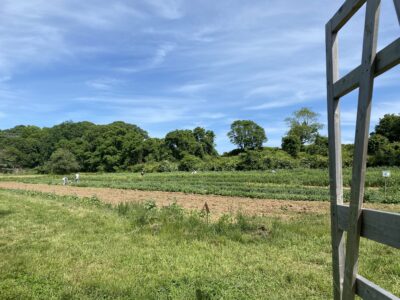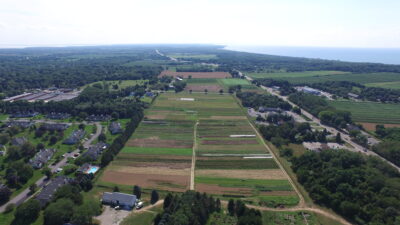Blog
Leasing and Grant Program Supports Growth of Farms
By Kathleen Kennedy
You can’t have local food without local farmers. Supporting Long Island’s farms and their farmers is a high priority to the Trust, and is the driving force in much of our work, including our Farms for the Future Initiative. In fact, since our founding in 1983, and with your help, the Peconic Land Trust has preserved more working farms on Long Island than any other private conservation organization. Long Island’s farms and farm families are central to our economy and our heritage. Given intense development pressures, escalating real estate values, a declining number of food production farmers, and the lack of affordable farmland for both new and established farmers, our Farms for the Future Initiative has been an excellent tool to help address some of these challenges.
As part of this initiative, we are focused on providing access to affordable farmland by purchasing, protecting, rebuilding and reselling farms to farmers. In addition, the Trust’s expanded Farmland Leasing Program provides local farmers access to affordable land – whether to expand their existing operation, or to provide them a place to start. Farmland owned by the Trust is available for leasing, primarily in Amagansett, East Hampton, and Southold communities, and those who have leased from the Trust include Balsam Farms, Amber Waves Farm, Bhumi Farms, Sang Lee, Invincible Summer Farms, Browders Birds, and many more. The Trust is proud to partner with and support these hardworking farmers.
Another successful farm partner is Mary Woltz, owner of Bees’ Needs. Mary manages the bee hives at Quail Hill Farm since 2004, providing the farm with very effective pollination services and her delicious honey for farm members. Mary remarked, “the Peconic Land Trust, through its extensive preservation of farmland and open space, is an important general contributor to maintaining bee habitat in our area.” Mary feels fortunate to have met Farm Director Scott Chaskey, and believes that his continuing advocacy on behalf of the bees – planting cover crops to feed both the bees and the soil – provides the support they need to flourish during challenging times. “What my Quail Hill bees lack in production, they compensate for in quality. Quail Hill honey was nationally recognized with a Good Food Award in 2014.” Mary’s apiary business has grown from her original 6 hives, installed in 2004. She now owns eleven hives situated in three farm locations, and manages a total of 63 at fourteen South Fork locations!
“The Peconic Land Trust, through its extensive preservation of farmland and open space, is an important general contributor to maintaining bee habitat in our area”
Mary Waltz
Because of our successful efforts to support local farmers, the Trust was selected in 2015 by Empire State Development (ESD) to oversee the administration of $1 million in funds available to farmers through an Agricultural Capital Equipment Grant program. Grant recipients Michael and Isabel Osinski of Widow’s Hole Oyster Company in Greenport were grateful to receive financial assistance through this program for an equipment change to improve the function of their business.
It was 2002 when Mike and Isabel learned that their Greenport harborfront property included 5 acres of baybottom, and with time on their hands since retirement, they decided to start an oyster farming business. Widows Hole Oyster Company grows only Long Island native oysters, “Crassostrea virginica,” using a traditional oyster cage system which rests very close to the bay bottom. The bottom-resting system was adequate but impacted on speed of their maturity, the cleanliness of the oyster upon harvesting, and limited the amount of algae available for the oysters to feed on since algae grows closer to the surface. Through research, Mike and Isabel learned about a newer technology of oyster baskets that float close to the surface, eliminating some of the challenges they were facing.
Interested in converting to floating baskets, the Osinskys applied for and received grant funds from the Trust in early 2016 which helped them to purchase the new equipment and the structures to support them. While the grant requires a matching investment from the farmer, the Osinskis felt the funding assistance made a real difference to their upgrade. Mike remarked, “We needed the incentive of the 20% match to make the commitment to changing to new gear, otherwise we may have stayed with the method we knew.” The new baskets’ proximity to the surface has enhanced the amount of algae available for the oysters to feed on. The oysters also come out of the water cleaner, reducing the processing time required for Mike and Isabel to get them market-ready. In addition, the wave action of the Greenport Harbor tides gently tumbles the growing oysters in the baskets, altering the cup-shaped shells and allowing for fatter, meatier oysters, the kind that knowledgeable foodies and restauranteurs demand. The new system is making a difference to the Osinski’s operation.
A variety of local farmers have benefitted from the grant funds provided by ESD. Funds have been used for the purchase of agricultural structures like deer fencing, for farm equipment, infrastructure needed to convert a local farm to a dairy operation, upgrades for energy efficiency at a local winery, and more. With $1 million available through the ESD and just over $300,000 provided to applicants to date, there is more money available for agricultural operations that qualify. In addition, changes to the current grant are under consideration, which include increasing the grant limit from $25,000 to $50,000, allowing a grant recipient to request a second grant, and allowing farmers to submit for funding after their project is complete



